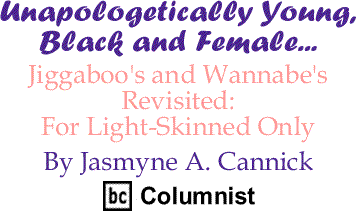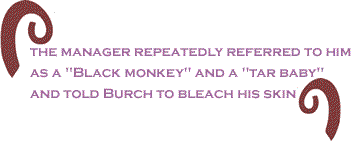
|
|||||||||||||||||||||
|
||||||||||
|
||||||||||
|
The current issue is always free to everyone If
you need the access available to a |
||||||||||
 |
||||||||||
 |
||||||||||
| The "Light Skin Libra Birthday Bash," which was to take place at a Detroit 's Club, APT, was the brainchild of a self-described "dark skinned" African-American, Detroit DJ and party promoter. The party was intended to let "light-skinned" Black women into a downtown club for free. In his defense, Ulysses "DJ Lish" Barnes, said that he had plans for "Sexy Chocolate" and "Sexy Caramel" parties too. The good news is that the parties have been canceled after much criticism and calls for boycotts and lawsuits. There are no words for some of the ignorant (insert four letter word that starts with an s rhymes with hit), that we do to ourselves. But let me give it a try. The short version. History has shown that Black people with lighter skin were treated better. In the days of slavery, the dark-skinned Blacks worked in the fields while light-skinned Blacks worked in the house, hence the terms "field Negroes" and "house Negroes." It got so bad, that not only did the slave owners, who were often responsible for the lighter shade of brown his slaves had, give lighter-skinned Blacks more respect, but so did the dark-skinned Blacks. This evolved into generations of Blacks both consciously and subconsciously teaching themselves that one is better than the other, which eventually led to a billion-dollar fake hair industry. This was best illustrated in Spike Lee's 1988 film "School Daze" in the scene played out in a beauty parlor between the "jiggaboos," otherwise known as the darker-skinned Blacks with nappy hair, and the "wannabe's," the lighter-skinned Blacks with straight often times weaved hair. But who could forget the film version of Alice Walker's novel "The Color Purple" in which Mister asked for Nettie who was "chocolate" colored with long hair but was given Celie, who was dark-skinned with nappy and short coarse hair, instead. This was followed by a grown-up Celie dealing with the harsh realities of beauty and Mista's in-house mistress Shug Avery. Then you had Black sororities and fraternities who used the "brown paper bag test" to deny entrance to anyone darker than the bag.
There continue to be Black children who prefer to play with dolls that are white with blond hair and blue eyes. Some Black children actually identify with these dolls over dolls of their own race, which could explain the 2003 case between two Georgia Applebee's restaurant employees. At the time, Dwight Burch a dark-skinned waiter, was an Applebee's restaurant employee. He filed a lawsuit against Applebee's and his light-skinned African-American manager, alleging that during his employment, the manager repeatedly referred to him as a "Black monkey" and a "tar baby" and told Burch to bleach his skin. Burch claimed he was fired after he refused to do so. His case was settled for $40,000. But what about decades of rap music videos where the preferred "ho" is a lighter shade of brown? And the fact that only recently we're seeing advertisements that highlight Black women who choose to wear their hair in its natural state and are dark-skinned, even in our own magazines. Remember actress Jennifer Beals' famous quote, "I thought I would never get in. I thought they only took geniuses. But I was lucky, because I'm a minority. I'm not Black, and I'm not White, so I could mark 'other' on my application, and I guess it's hard for them to fill that quota," on how she got into Yale University. Beals, whose father was Black, seldom identifies with the Black community, despite being nominated for an NAACP Image Award. And then there was singer Prince, who despite having Black parents, listed in his press bio when he made it in the business, that he was Italian, among other things.
More recently there was the University of Georgia's 2006 controversial study on skin tone which confirmed that light-skinned Blacks are often more likely to be considered for jobs over dark-skinned Blacks. Wrap it all together and what you get a classic example of Dr. Joy DeGruy-Leary's P.T.S.S., otherwise known as post-traumatic slave syndrome. You know, I can't think of one time that I witnessed or heard of white children taunting each other for being paler than the next, but I can think of numerous occasions when I have seen Black children teasing each other for being "too Black." And while our lighter skin shades can be attributed to the Massuh's preference for his female Black slaves over his own wife, we can't blame the Massuh for us continuing to feed into the hype that light is good and dark is bad. Over the weekend, I attended L.A.'s Taste of Soul Festival on Crenshaw Blvd. I observed for quite some time the activity at a booth selling hair extensions. Black women, young and old, light and dark, crowded the booth to touch and feel the long straight flowing hair extensions that were guaranteed not to shed or to "nap up." This, while nearby booths, offering free diabetes, obesity, and HIV/AIDS tests went virtually unnoticed. Go figure. While the party in Detroit is sad, it's the manifestation of generations of Blacks still buying into the slave "house Negro" and "field Negro" mentality given to us by the Massuh. Don't you think there are enough forces out there trying to divide us without us giving them a helping hand? You know, it's funny I never heard of lighter prison sentences for lighter Blacks. Black is Black no matter how light or how dark your skin is. And on a side note, I find it completely baffling that while some of us (Lil' Kim) are out there trying to lengthen, lighten, and straighten our hair, bleach our skin, and even resort to plastic surgery to change our nose, on the flip side they're busy with botox, breast and butt implants, and tanning salons. BC Columnist Jasmyne Cannick is a social commentator, nationally syndicated journalist and activist who was chosen as one of ESSENCE Magazine's 25 Women Shaping the World. She is a member of the National Association of Black Journalists and writes a popular daily blog at jasmynecannick.com. She resides in Los Angeles. Click here to contact Ms. Cannick. |
||||||||||
| October
18,
2007 Issue 249 |
|
| Printer Friendly Version in resizeable plain text format format |
 |
 |
 |
| |
| |


































